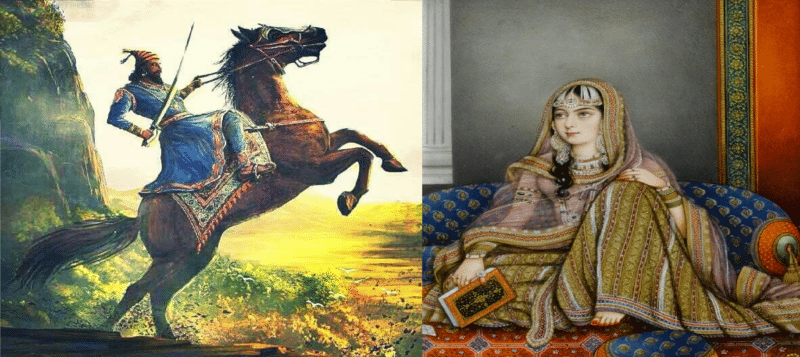Who was Aurangzeb’s daughter attracted to?


We know Emperor Aurangzeb “Alamgir” for his craze to completely Islamize India and for his atrocities. There was no end to his cruelty and he did not even spare his family. But they say, the one who does not lose from others, suffers defeat from their own people. Aurangzeb was humiliated and defeated by many people, but the ‘deepest wound’ he got was from his own eldest daughter, Zeb-un-Nissa. In this article we will learn about Zeb-un-Nissa , whose strong and creative personality always irrigated her father Aurangzeb. She was also greatly influenced by the personality of Chhatrapati Shivaji Maharaj.
Zebunnisa was Aurangzeb’s favorite
Born on 15 February 1638 in Daulatabad Fort, now known as Devagiri, Princess Zeb-un-Nissa was once Aurangzeb’s favorite. The eldest daughter of Queen Dilras Banu Begum was Aurangzeb’s favorite because she had memorized the Qur’an at the very tender age of only three years and later became a Hafiza at the age of seven years.
The occasion was celebrated by his father with a huge feast and a public holiday. The princess was also rewarded with 30,000 gold pieces by her pleased father. Aurangzeb also paid the princely sum of 30,000 gold pieces to her teacher Ustad Bi for teaching his intelligent daughter well.
Zebunnisa (Zeb-un-Nissa) also learned the science of time from a Persian poet named Mohammad Said Ashraf Mazandharani. In addition, the princess learned philosophy, mathematics, astronomy, literature and had a good reputation in calligraphy. In simple words, Princess Zebunnisa was rich in versatility and she was also the most educated among all the Mughals at that time.
There was no place for art in Aurangzeb’s Court
Princess employed many scholars to produce literary works in their own dialect or to copy manuscripts at good wages. Zeb -un-Nissa had a rich library, which included religious texts like the Quran, ancient Hindu and Jain texts, Greek mythology, Persian texts, travel accounts of the scholar Alberuni, translations of the Bible, and contemporary writings about her ancestors. Her library also provided literary works on every subject, such as law, literature, history and theology. Aurangzeb rarely interfered in these works, but who knew that this carelessness of his towards his daughter would later become a problem for him.
The princess was not only a scholar, but also an excellent poetess and composer. But there was no place for art in Aurangzeb’s Court and Jebunnisa was a connoisseur of all those genres, which greatly annoyed Aurangzeb. In such a situation, he started writing poems under the pen name of Makhfi.
The personal life of Zeb -un-Nissa was full of hardships. There were many people who loved her, but she could not have a relationship with anyone even if she wanted to, because somewhere the biggest obstacle was Aurangzeb’s anger and his brutality. But gradually this brutality became unbearable for her, and she would protest against it from time to time.
For example, when Prince Mohammad Akbar rebelled against Aurangzeb’s behavior and took refuge in Rajputana, Zebunnisa went against the expectations and supported him. Rana Raj Singh, one of Aurangzeb’s most staunch enemies, and Rao Durgadas Rathore, the protector of Marwar, both gave shelter to Mohammad Akbar.
Attracted to the personality of Chhatrapati Shivaji Maharaj
But this was not the sole reason, behind Zeb-un-Nissa’s stature in eyes of Aurangzeb from being most beloved daughter to giving stinging effects in his eyes. The arrival of a person in Agra came like an earthquake in the Mughal dynasty. After the reconciliation at Purandar, Chhatrapati Shivaji Maharaj came to Agra, where Aurangzeb left no stone unturned to show his arrogance as per his nature. But his humiliation was not acceptable to Chhatrapati Shivaji Maharaj and he boycotted the Mughal court challenging Aurangzeb, and this move also affected Princess Zebunnisa.
Princess Zebunnisa (Zeb-un-Nissa) was attracted towards the personality of Chhatrapati Shivaji Maharaj. But whether this attraction was of respect or love, it is still a matter of debate. Now Chhatrapati Shivaji Maharaj always treated women with respect, and when a warrior presented the wife/daughter of a Muslim ruler as a ‘gift’ to please the king, he reprimanded that warrior and instead let that woman return to her home with respect and dignity.
In such a situation, he could never had been attracted towards Princess Jebunnisa, but it cannot be denied that Princess Jebunnisa was greatly influenced by Chhatrapati Shivaji Maharaj’s nature and his personality, and this development had also upset Aurangzeb a lot. In the end, Aurangzeb imprisoned her after being furious with her rebellious thoughts and her rebellious attitude and nature, and she spent the last 20 years of her life in seclusion in the Salimgarh Fort of Shahjahanabad, where she died in 1702. Her writings were compiled and published in 1724 under the name of “Diwan-e-Makhfi”, and it would not be wrong to say that the personality of Princess Zebunnisa was an enigma like her life, and because of which she was not as much afraid of Chhatrapati Shivaji Maharaj. Aurangzeb must have had been more frightening figure for her.
DISCLAIMER: The author is solely responsible for the views expressed in this article. The author carries the responsibility for citing and/or licensing of images utilized within the text.
